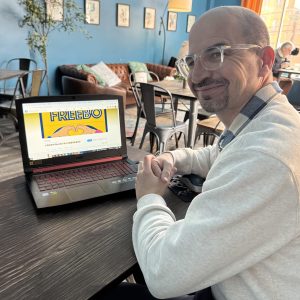Advice from strangers
The realization hit me while I was staring at a bowl of lentil soup. I live in Spain. I looked up at my host mom and roommate across the table and it suddenly felt real. For the next three months, this apartment in Sevilla, Spain is home.

The first two weeks of my semester studying abroad were full of incredible memories I’ll cherish forever, from singing along with the crowd at a Sevilla FC soccer match to watching a group of local men break out into spontaneous flamenco dance near the Guadalquivir River.
In between trying octopus tapas and enjoying the hundreds of orange trees that line my walk to school every morning, I’ve spent a lot of time reflecting on two pieces of advice I received from local strangers before I left for Spain.
The first piece of advice came from my dental hygienist. I had met her a couple times before, but wouldn’t say we knew each other well. When I mentioned my plan to study abroad in Spain, she told me I should try to befriend some Carmelites, a religious group within the Catholic church known for their focus on prayer. I was surprised to hear her mention the group because one of my college professors recommended I read St. Teresa of Avila, a great reformer of the Carmelites, to gain a greater understanding of the history of Catholicism in Spain. I nodded eagerly and asked if she knew about Teresa, to which she responded, “Of course!”

She went on to share how she started reading Teresa’s writings when she was my age. I was stunned by the coincidence. We talked more about my travel plans and aspirations, and I shared I was feeling apprehensive about leaving for Spain. I worried whether I’d find a community there or struggle to find friends. My dental hygienist smiled and said if I needed to find people I could always head over to a monastery and befriend some Carmelite nuns. The hope of a monastery with friendly nuns waiting for me in Spain helped assuage my fears. My dental hygienist taught me there will always be a way to bond with people, a common ground, even if it’s over something as obscure as a Carmelite reformer.

When I arrived in Spain and met my host mom, she kindly showed me how to get to our flat and spoke the fastest Spanish I’d ever heard. I tried to catch as much as I could, but I remember dragging my suitcases behind me while trying to decipher her Spanish in vain. Over the past few weeks I’ve grown leaps and bounds in my ability to understand her Spanish and we now have deep conversations about feminism, politics in Spain and the meaning of life. We found common ground over dinner while discussing how women are treated in society. My host mom lived under Francisco Franco’s dictatorship and remembers when women were prohibited from employment, ownership of property and traveling away from home without a husband’s approval in Spain. As we talked about how women are treated today, I felt this intense kinship with her and my roommate. We may not have language, culture or generation in common, but we have a unique bond as women. From that moment on I’ve felt much closer to my host mom and love our late-night conversations over dinner. My dental hygienist’s advice, that you can bond with anyone, helped prepare me to find a connection point even in a foreign language.
A few days after my dentist appointment I stopped at my new hairdresser. While discussing our mutual love for travel, I mentioned I’d be leaving for Spain in a few days. My hairdresser started telling me about his travels to Spain, including the time he bought a sword from Toledo, Spain, only for it to be confiscated by customs in the States. Hearing him talk about his adventures (and misadventures) abroad made me excited to depart on a journey of my own. At the same time, however, I worried about my Spanish-speaking abilities. My hairdresser quickly assured me, “When you have to speak, you’ll speak.” He told me about the time he visited France. Although he didn’t think he spoke much French, the pressure to communicate helped him rise to the occasion. He emphasized there was no use worrying ahead of time.

In Spanish, there’s a phrase for this mentality: no pasa nada. Miss a train? No pasa nada. Misunderstand your host mom? No pasa nada. Buy the wrong soccer tickets? No pasa nada. My hairdresser’s belief in my Spanish-speaking abilities was a small taste of the ‘no pasa nada’ Spanish lifestyle I’ve been embracing these past few weeks. He reminded me to be optimistic in my abilities and not to worry over the future.
Both my dental hygienist and hairdresser gave me meaningful pieces of advice to reflect on during my first two weeks studying abroad. Search for common ground, and, if you struggle to find it, no pasa nada.
In classic hero’s journey fashion, I feel as if I stumbled across the exact people I needed to hear from before moving to Spain. During these first few weeks I’ve already learned so much about myself and I’m grateful for the local strangers I met before starting my journey. They gave me the pieces of wisdom I needed before launching on this new adventure.






